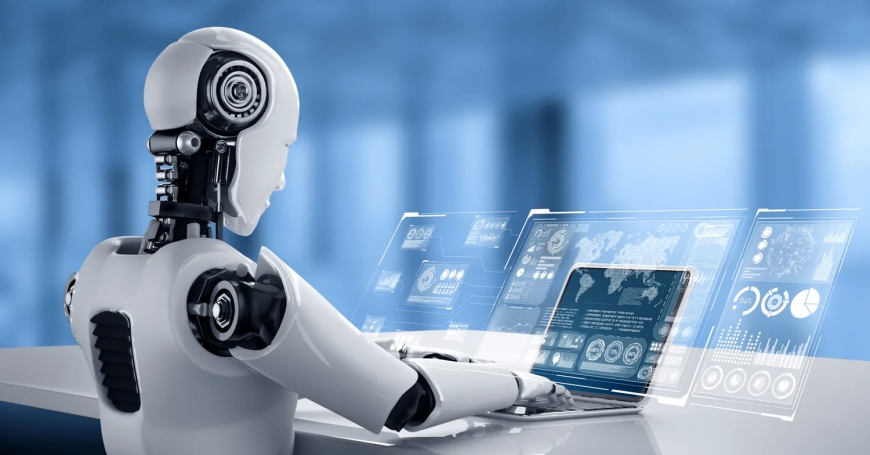Key Trends Shaping the Future of Data Science and Machine Learning

Data science and machine learning (ML) have emerged as transformative technologies, redefining industries and influencing everyday life. From personalized recommendations to predicting market trends, these fields hold immense potential. As technology continues to evolve, several key trends are poised to shape the future of data science and ML. Let’s explore these trends and understand their impact on the industry.
Generative AI: Revolutionizing Content Creation
Generative AI, exemplified by models like GPT-4 and DALL·E, has redefined content creation, art, and natural language processing (NLP). These models are capable of generating highly realistic text, images, and even code. Businesses are leveraging this technology for creating marketing content, designing virtual environments, and automating repetitive tasks.
The continuous refinement of generative AI is expected to enhance personalization in user interactions and drive innovation in creative industries.
Edge Computing and Real-Time Data Processing
Edge computing enables data processing closer to its source, reducing latency and enhancing real-time decision-making. With the rise of IoT devices, the demand for decentralized processing is increasing. Machine learning models deployed at the edge allow for faster insights and reduced dependency on centralized cloud systems.
Applications such as autonomous vehicles, smart cities, and wearable health monitors rely heavily on edge computing to deliver instantaneous responses.
The Convergence of Data Science and Cloud Technologies
Cloud platforms continue to play a crucial role in scaling data science and ML applications. Services like AWS, Google Cloud, and Azure provide powerful tools for data storage, processing, and analytics.
The integration of ML tools with cloud services simplifies workflows, making data analysis more accessible. Organizations can now deploy models globally, ensuring scalability and collaboration across teams.
Automated Machine Learning (AutoML)
AutoML is transforming how models are built, trained, and deployed. By automating complex processes, AutoML lowers the barrier to entry for non-experts while enhancing efficiency for seasoned professionals.
From selecting optimal algorithms to hyperparameter tuning, AutoML tools streamline workflows, allowing data scientists to focus on strategic tasks. This trend is democratizing AI, empowering small businesses to leverage ML without extensive technical expertise.
Responsible AI and Ethical Practices
As AI systems become more ingrained in decision-making processes, concerns about fairness, bias, and transparency have intensified. Ethical AI emphasizes accountability, ensuring that models produce unbiased outcomes and respect user privacy.
Frameworks and guidelines are emerging to address these issues, with companies prioritizing explainable AI to foster trust. Building systems that are both accurate and ethically sound will be a cornerstone of future AI development.
Hybrid and Federated Learning Models
Federated learning enables collaborative training of models across multiple devices or organizations without sharing sensitive data. This approach enhances privacy while allowing robust model development.
Hybrid models, which combine the strengths of multiple algorithms or architectures, are also gaining traction. These models offer improved accuracy and adaptability, making them ideal for diverse applications like healthcare diagnostics and financial forecasting.
Enhanced Natural Language Processing (NLP)
The evolution of NLP is breaking language barriers and enabling seamless human-computer interaction. Advancements like transformers and attention mechanisms have revolutionized text understanding, translation, and summarization.
Applications such as chatbots, virtual assistants, and sentiment analysis tools are becoming more intuitive and context-aware. In the future, we can expect NLP systems to better comprehend nuances like tone, intent, and cultural references.
Integration of Quantum Computing
Quantum computing promises to solve problems previously deemed unsolvable due to their complexity. For data science and ML, quantum algorithms offer significant speed-ups in tasks such as optimization and pattern recognition.
Although still in its infancy, quantum computing is expected to complement classical methods, unlocking new possibilities in areas like drug discovery, cryptography, and climate modeling.
Focus on Interdisciplinary Approaches
The future of data science depends on collaboration across various disciplines. Combining expertise from fields like biology, economics, and social sciences can yield more comprehensive insights.
For instance, integrating biological data with machine learning has advanced precision medicine, while economic modeling enriched with data science enhances policy formulation. This trend underscores the importance of diverse skill sets in driving impactful solutions.
Sustainability in Data Science
Sustainability has emerged as a key priority across industries, technology included. Data centers consume vast amounts of energy, prompting efforts to optimize operations and reduce carbon footprints.
Green AI, an emerging concept, emphasizes energy-efficient algorithms and sustainable practices in model training. By prioritizing environmental responsibility, the tech industry aims to balance innovation with ecological preservation.
The Rise of No-Code and Low-Code Platforms
No-code and low-code platforms empower users to build applications and workflows without extensive programming knowledge. These platforms integrate ML capabilities, enabling businesses to create predictive models and analytics dashboards effortlessly.
By lowering entry barriers, these tools drive innovation and make advanced technologies accessible to a broader audience, fostering widespread adoption.
AI-Driven Cybersecurity
With cyber threats becoming increasingly sophisticated, AI is playing a pivotal role in strengthening defenses. Machine learning models analyze vast datasets to identify anomalies, detect breaches, and respond to threats in real time.
Proactive cybersecurity measures powered by AI are critical for protecting sensitive information, especially as remote work and digital transformation expand attack surfaces.
Conclusion
The fields of data science and machine learning are evolving rapidly, driven by technological advancements and growing demand across industries. Trends like generative AI, edge computing, AutoML, and responsible AI are shaping the future, offering exciting opportunities for innovation and problem-solving.
As these technologies mature, staying updated and acquiring relevant skills, such as through a Data Science Training Course in Pune, Mumbai, Patna, Nagpur, and more cities in India, will be essential for professionals aiming to remain competitive. By embracing these trends, businesses and individuals alike can unlock the full potential of data-driven insights.
What's Your Reaction?






















